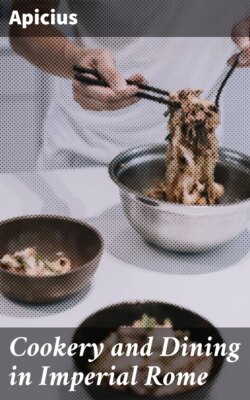Читать книгу Cookery and Dining in Imperial Rome - Apicius - Страница 32
На сайте Литреса книга снята с продажи.
Apicius the Writer
ОглавлениеTable of Contents
Most of the Apician directions are vague, hastily jotted down, carelessly edited. One of the chief reasons for the eternal misunderstandings! Often the author fails to state the quantities to be used. He has a mania for giving undue prominence to expensive spices and other (quite often irrelevant) ingredients. Plainly, Apicius was no writer, no editor. He was a cook. He took it for granted that spices be used within the bounds of reason, but he could not afford to forget them in his formulæ.
Apicius surely pursues the correct culinary principle of incorporating the flavoring agents during the process of cooking, contrary to many moderns who, vigorously protesting against “highly seasoned” and “rich” food, and who, craving for “something plain” proceed to inundate perfectly good, plain roast or boiled dishes with a deluge of any of the afore-mentioned commercial “sauces” that have absolutely no relation to the dish and that have no mission other than to grant relief from the deadening monotony of “plain” food. Chicken or mutton, beef or venison, finnan haddie or brook trout, eggs or oysters thus “sauced,” taste all alike—sauce! To use such ready-made sauces with dishes cooked à l’anglaise is logical, excusable, almost advisable. Even the most ascetic of men cannot resist the insidiousness of spicy delights, nor can he for any length of time endure the insipidity of plain food sans sauce. Hence the popularity of such sauces amongst people who do not observe the correct culinary principle of seasoning food judiciously, befitting its character, without spoiling but rather in enhancing its characteristics and in bringing out its flavor at the right time, namely during coction to give the kindred aromas a chance to blend well.
Continental nations, adhering to this important principle of cookery (inherited from Apicius) would not dream of using ready-made (English) sauces.
We have witnessed real crimes being perpetrated upon perfectly seasoned and delicately flavored entrées. We have watched ill-advised people maltreat good things, cooked to perfection, even before they tasted them, sprinkling them as a matter of habit, with quantities of salt and pepper, paprika, cayenne, daubing them with mustards of every variety or swamping them with one or several of the commercial sauce preparations. “Temperamental” chefs, men who know their art, usually explode at the sight of such wantonness. Which painter would care to see his canvas varnished with all the hues in the rainbow by a patron afflicted with such a taste?
Perhaps the craving for excessive flavoring is an olfactory delirium, a pathological case, as yet unfathomed like the excessive craving for liquor, and, being a problem for the medical fraternity, it is only of secondary importance to gastronomy.
To say that the Romans were afflicted on a national scale with a strange spice mania (as some interpreters want us to believe) would be equivalent to the assertion that all wine-growing nations were nations of drunkards. As a matter of fact, the reverse is the truth.
Apicius surely would be surprised at some things we enjoy. Voilà, a recipe, “modern,” not older than half a century, given by us in the Apician style or writing: Take liquamen, pepper, cayenne, eggs, lemon, olive oil, vinegar, white wine, anchovies, onions, tarragon, pickled cucumbers, parsley, chervil, hard-boiled eggs, capers, green peppers, mustard, chop, mix well, and serve.
Do you recognize it? This formula sounds as phantastic, as “weird” and as “vile” as any of the Apician concoctions, confusing even a well-trained cook because we stated neither the title of this preparation nor the mode of making it, nor did we name the ingredients in their proper sequence. This mystery was conceived with an illustrative purpose which will be explained later, which may and may not have to do with the mystery of Apicius. Consider, for a moment, this mysterious creation No. 2: Take bananas, oranges, cherries, flavored with bitter almonds, fresh pineapple, lettuce, fresh peaches, plums, figs, grapes, apples, nuts, cream cheese, olive oil, eggs, white wine, vinegar, cayenne, lemon, salt, white pepper, dry mustard, tarragon, rich sour cream, chop, mix, whip well.
Worse yet! Instead of having our appetite aroused the very perusal of this quasi-Apician mixtum compositum repels every desire to partake of it. We are justly tempted to condemn it as being utterly impossible. Yet every day hundreds of thousand portions of it are sold under the name of special fruit salad with mayonnaise mousseuse. The above mystery No. 1 is the justly popular tartar sauce.
Thus we could go on analyzing modern preparations and make them appear as outlandish things. Yet we relish them every day. The ingredients, obnoxious in great quantities, are employed with common sense. We are not mystified seeing them in print; they are usually given in clear logical order. This is not the style of Apicius, however.
